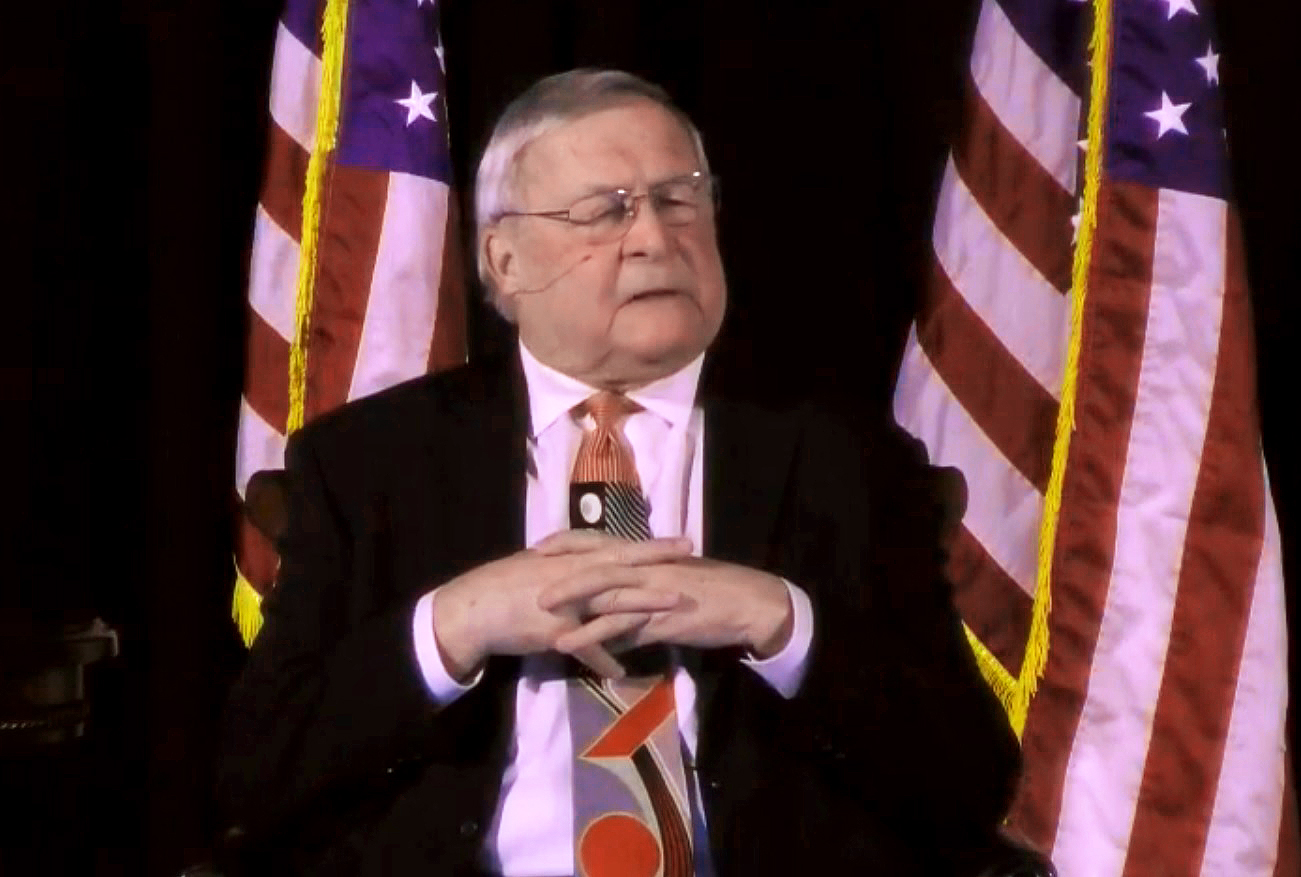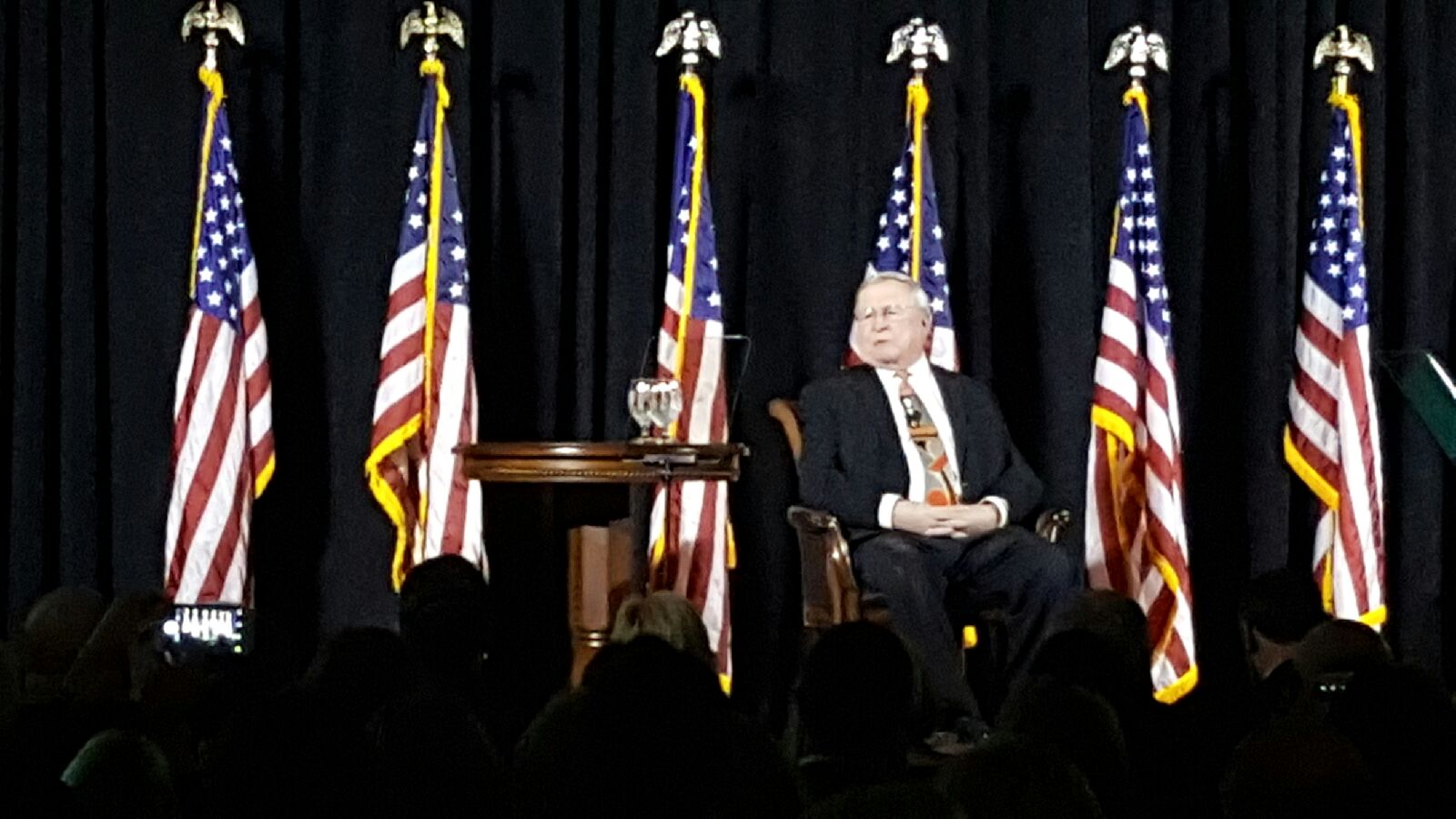L. Brooks Patterson Answers Community Questions After State of the County Speech
WDET audience asks Oakland County Executive about transit, Detroit, medical marijuana and higher education funding.


Oakland County Executive L. Brooks Patterson says the county is strong and getting stronger. He laid out a long list of businesses moving to Oakland County during his State of the County speech last night. Although Patterson’s speech outlined — at times in meticulous detail — many of Oakland County’s recent accomplishments. It’s what he didn’t say in the speech that might be most noteworthy.
WDET asked listeners to send in questions they hoped he’d address in the speech. He didn’t touch on Oakland County’s relationship with Detroit and the region, mass transit, or any of the topics they hoped to hear about.
But Host Stephen Henderson asked Patterson some of those questions the morning after the speech:
DETROIT COOPERATION
Listener Robert asked, “Including transit, people and ideas, how are you going to connect Oakland County to Detroit?” Listener Lindsay also asked, “How can Oakland County forge stronger ties with Detroit?”
Listen to how Patterson answered
PATTERSON: “Everybody’s looking at Detroit and all the things happening there, and that’s good… What’s happening there is exciting. And I’m rooting for them. I really am, because, frankly, the stronger Detroit is, the easier it is for me to recruit business in to my county. A lot of people saw Detroit as a hurdle. And I often said, if I was the county (executive) for rural San Francisco or Denver or Chicago, I could use my core city as an attraction. That wasn’t always possible up until now. Now, it’s starting to have some real revitalization.”
TRANSIT
“What do you want to see from a regional transit millage? Need more buses in northern Oakland? What regional transit would get your support?” asked Megan Owens, who directs the local transit advocacy group Transportation Riders United, and campaigned heavily for the passage of the failed Regional Transit Authority millage in 2016.
Listen to how Patterson responded
PATTERSON: “It would have to be a regional plan that treated everybody… if we’re going to be taxed, we want some service. And I don’t think that’s an unfair request. And we’re willing to pay our share. We always have. Personally, I have led the fight for the SMART millage three times. I came out for it way back when and for the renewal and for the renewal. So, I’m clearly not opposed to a regional transit program. But the service has to be fairly implemented across the tri-county (region). And I’m not a big fan of light rail. It’s just a rigid Point-A-to-Point-B. You can’t deviate. So, I really favor a flexible bus transit plan that can move in and out of neighborhoods, in and out of business districts. Right now, we have as much traffic east-west as we do north-south. That’s all changed over the last 20 years, 25 years. So, we have to adopt plans that are flexible enough to pick up on those subtle changes.”
HENDERSON: “So, if they were to come back, say, in two years with a better plan, from your perspective, you’re open, then, to the conversation?”
PATTERSON: “Yes. Yes, I am.”
MEDICAL MARIJUANA MARKET
“Why does medical cannabis get such unjust consideration in Oakland County? We give all business to south of Eight Mile,” asked an anonymous listener. Live caller JoAnne in Detroit had a similar question, focusing on the possible tax revenue Oakland County might be missing out on by keeping medical marijuana distributors out.
Listen to Patterson and Henderson discuss the issue
PATTERSON: “I don’t think the clinics – or whatever you want to call them – that opened up in abandoned gas stations is hardly what the public had in mind when they thought that medical marijuana – I think they had the same idea that they’d be authorized and dispensed by a pharmacist in a white coat. But you go into a gas station and say, ‘Hey, I’ve got a bad elbow. I need my medical marijuana,” which is really what began to happen. I guess you’ve got to go back to my prosecutor days, OK? I was prosecuting attorney from (1972) to (1988). And… marijuana itself – not medical marijuana – marijuana itself is a hallucinogenic drug. The active ingredient… is THC. Everybody knows THC is a mind-expanding, mind-altering drug. So… with medical marijuana… I didn’t vote for it, but I really think people thought it would be controlled. The authorizing legislation, which was done by referendum, was sloppy, it lacked detail, and they’re going to go back now, back to the drawing board, and try to come up with something with a little more sense to it.”
HENDERSON: “So, the idea of tax revenue, though, from these clinics doesn’t somehow overtake those concerns for you?”
PATTERSON: “No. It’s just, when it comes to things like that, I just tend to think that taxes – yes, I’d love to have the revenue, I guess (it could bring in) $100 million or something like that? So, it’d be important. But do we have any social consequences that the taxes just don’t offset? I just think the introduction of another drug keeping pace with alcohol and tobacco is about the last thing we need. But it goes back to my days as prosecutor. I was told that I’ve got some issues with my cholesterol, I think it was, and the medical marijuana could, in fact, be useful. So, I’m not ruling it out as a valid argument. But I’m just saying we better have a better reason than revenue. Otherwise, we can legalize prostitution, there might be revenue there. We can legalize heroin, there might be revenue there.”
HENDERSON: [Laughs] “That’s a little different, but I see where you’re going.”
PATTERSON: [Laughs] “Well, I know. But revenue ought not be the guiding principal.”
FUNDING FOR OAKLAND UNIVERSITY
Listener Garry asked, “Oakland University ranks dead last among 15 state colleges in appropriation funding per student from the state. Can you help fix this?”
Listen to Patterson’s answer
PATTERSON: “It’s beyond the authority of the county exec. It’s a state funding issue, but OU is continuing to grow. They’re pushing 22,000 (students) now and they’re almost there. They’ve outstripped the housing. If we are dead last, I didn’t know that stat(istic). If we are dead last, it certainly isn’t affecting the students who are coming there, and now the new medical school they really have an excellent curriculum of courses, from computer technology to engineering, which of course are the jobs of the 21st century … I was unaware that they were in dead last. I’ll have to look that up, but it certainly hasn’t hurt the enrollment.”
